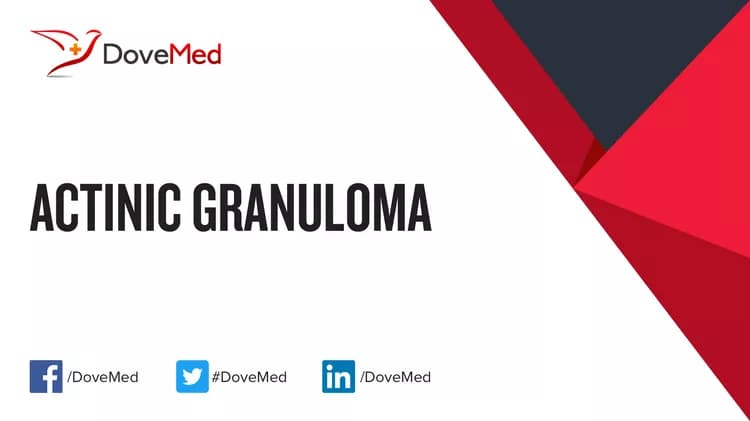What are the other Names for this Condition? (Also known as/Synonyms)
- Annular Elastolytic Giant Cell Granuloma
- Giant Cell Elastophagocytosis
- O’Brien’s Granuloma
What is Actinic Granuloma? (Definition/Background Information)
- Actinic Granuloma is a skin condition that presents ring-shaped plaques on skin areas that have been exposed to the sun. The condition begins with small pink bumps, which come together to form larger, thickened skin patches
- The disorder is believed to be an inflammatory response to sun damage, and it predominantly affects middle-aged adults, specifically Caucasian women
- Actinic Granuloma does not lead to many complications; nevertheless, the condition is difficult to treat. Isotretinoin, acitretin, and ciclosporin have been used to treat the condition with varying degrees of success
- But, generally, it does not decrease the quality of life of the affected individual. Protection and limiting direct exposure to the sun are the best preventative measures available against Actinic Granuloma
Who gets Actinic Granuloma? (Age and Sex Distribution)
- Actinic Granuloma is a condition predominantly affecting fair-skinned middle-aged adults, particularly women
- Those living in sunny climates are more vulnerable to this skin condition compared to individuals living in cooler climates
What are the Risk Factors for Actinic Granuloma? (Predisposing Factors)
- The major known risk factor for Actinic Granuloma is sun exposure
It is important to note that having a risk factor does not mean that one will get the condition. A risk factor increases one's chances of getting a condition compared to an individual without the risk factors. Some risk factors are more important than others.
Also, not having a risk factor does not mean that an individual will not get the condition. It is always important to discuss the effect of risk factors with your healthcare provider.
What are the Causes of Actinic Granuloma? (Etiology)
The cause of Actinic Granuloma is not entirely understood, but there is strong evidence to suggest that the condition is an inflammatory response to prolonged and extensive sun damage of skin. The lesions are found on sun exposed skin, but the role of light remains unexplained.
Two theories have been presented with respect to the sequence of events for the initiation of granuloma formation:
- That the sun damage injures the elastic fibers in skin, triggering an inflammatory immune response, causing Actinic Granuloma
- Or, alternatively, exposure to sun’s rays leads to a weak inflammatory immune response (predominantly via CD4 lymphocytes) leading to granuloma formation, which causes damage to the skin elastic fibers
What are the Signs and Symptoms of Actinic Granuloma?
The signs and symptoms of Actinic Granuloma may include the following:
- The presence of flesh-colored pink bumps
- Large thick plaques: A plaque is a broad, raised area on the skin; it is usually broader than it is high
- Plaques with raised red border and pale center
- Irritated/inflamed areas of skin when exposed to the sun
How is Actinic Granuloma Diagnosed?
The diagnosis of Actinic Granuloma is made by the following tests and exams:
- A physical examination and clinical assessment of the presenting signs and symptoms
- An evaluation of medical history and nature of sun exposure
- A tissue biopsy to confirm a diagnosis and/or rule out other granuloma skin conditions, if deemed necessary
Many clinical conditions may have similar signs and symptoms. Your healthcare provider may perform additional tests to rule out other clinical conditions to arrive at a definitive diagnosis.
What are the Possible Complications of Actinic Granuloma?
- Although Actinic Granuloma is a chronic condition that is difficult to treat, there are no major complications associated with it
- However, this skin condition is known to recur in some individuals
How is Actinic Granuloma Treated?
In general, Actinic Granuloma does not respond well to therapy. However, the following treatment measures may be recommended by a healthcare professional:
- Limiting exposure to the sun
- Topical or intralesional injections of corticosteroids
- Phototherapy (use of certain wavelengths of light to treat the skin disorder)
- Prescription medication such as:
- Oral isotretinoin (a type of retinoic acid derived from vitamin A)
- Acitretin (a derivative of vitamin A)
- Cyclosporine (a drug that suppresses immune response)
How can Actinic Granuloma be Prevented?
The following are some tips for the prevention of Actinic Granuloma:
- Avoiding prolonged exposure to sunlight
- Wearing adequate sun protection; use of sunscreen creams or lotions to minimize exposure to harmful rays
- Monitoring for changes in skin, and seeking suitable medical attention if any skin changes are noted
What is the Prognosis of Actinic Granuloma? (Outcomes/Resolutions)
- Even though Actinic Granuloma is not responsive to treatment, the quality of life of the affected individual is generally not diminished
- Also, many individuals are not known to experience any significant symptoms from the condition
Additional and Relevant Useful Information for Actinic Granuloma:
- Sunburns occur following an exposure to ultraviolet (UV) light, either from the sun or from any other artificial source (such as from lamps during a tan)
The following resource can help you understand sunburns:
Related Articles
Test Your Knowledge
Asked by users
Related Centers
Related Specialties
Related Physicians
Related Procedures
Related Resources
Join DoveHubs
and connect with fellow professionals



0 Comments
Please log in to post a comment.